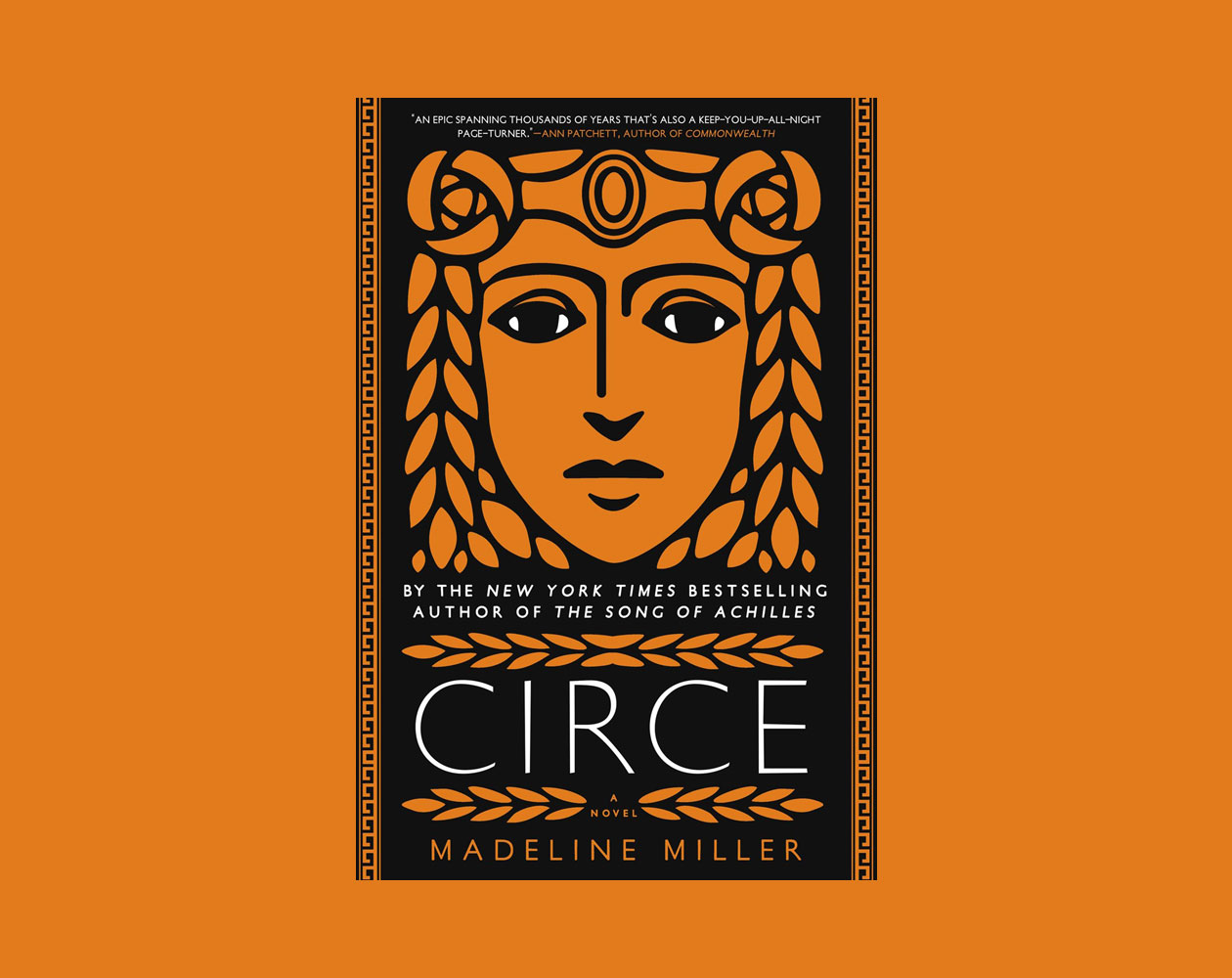The 2018 Rooster Summer Reading Challenge: Week Five
It's a new month in the 2018 Rooster Summer Reading Challenge. We welcome our July judges, Kelly McEvers and Nathan Deuel, and discuss the first half of Madeline Miller's Circe.

Welcome to the 2018 Rooster Summer Reading Challenge. We’ve selected six Rooster-worthy works of fiction from 2018 to read through August—two per month—and once a week we meet here to discuss our reading progress.
Each month we’re joined by a new judge, who discusses the books with us and then selects which of that month’s two books heads to our summer finale—where you, the readers, decide which novel wins the 2018 Rooster Summer Reading Challenge and an automatic berth in the 2019 Tournament of Books.
(Which kinda counts for a lot, seeing how our 2017 summer winner, Fever Dream, stampeded through the 2018 ToB, eventually taking home the Rooster. By the way, if all of this is new to you, check out this Rooster primer.)
To select our summer books, each of our judges chose a work of fiction they were particularly excited about this year. The other three books were selected by the ToB Committee according to our normal criteria—novels first published in English in the calendar year that we feel are excellent and interesting. (To avoid conflicts, none of the judges were assigned the books they selected personally.)
A special thanks to our Sustaining Members for making another year of the Rooster Summer Reading Challenge possible. Find out why The Morning News and the Tournament of Books depend on your support, and please consider becoming a Sustaining Member or making a one-time donation.
This month we’re reading Circe by Madeline Miller and Census by Jesse Ball, with Kelly McEvers and Nathan Deuel.
- See the reading list and discussion schedule
- Catch up on previous chats: Tomb Song (first half, second half), American Marriage (first half, second half)
- Jump into today’s discussion in the comments
Please note: We receive a cut from purchases made through the book links in this article.
Andrew Womack: Madeline Miller’s second novel, Circe, attempts a feat similar to her 2012 debut (and 2013 Tournament of Books competitor) The Song of Achilles: retelling Greek mythology from alternate viewpoints, this time from the perspective of Circe, a goddess of witchcraft best known for her appearance in Homer’s Odyssey.
But if you really want to know what Circe is all about, this tweet offers a pretty succinct description—and a strong argument for why you should to read it:
Hello. The book I will be bullying everyone into reading this summer is Circe, by @MillerMadeline. It's a gorgeous meditation on the many facets of justifiable women's rage, inside the Greek myths we know so well.May 24, 2018
And so far I’m 100 percent in on Circe. Every word, every action, everything about this book to this point, I love it. I think that covers it? Circe wins July. Thanks for joining us. Next up: The Friend by Sigrid Nunez.
OK, wait, actually let’s talk about this. And before we do that, let’s also welcome our July judges, Kelly McEvers, the host of NPR’s Embedded, and Nathan Deuel, the author of Friday Was the Bomb: Five Years in the Middle East. Kelly and Nathan, what did you think when you first heard about Circe?
Kelly McEvers is the host of NPR’s Embedded. Nathan Deuel is the author of Friday Was the Bomb: Five Years in the Middle East.
Andrew Womack is a founding editor of The Morning News.
Kelly McEvers: As a kid, I was drawn to the gods. (And I was trained, at Catholic school, to only refer to them with a lowercase “g.”) What kid isn’t into stories of heroes and battles and monsters? But the thing I actually do remember from back then, and the thing I found present from the earliest pages of this book, is just how, well, episodic it all is. I mean, when you live forever, you just keep living, right? And then this happened, and then this happened, and then this happened. Like, what is this building to? I say that not to be flip; it’s a question I had from the very beginning. While I admire Circe as a subversive, and I get the sense, early on, that she’s going to F stuff up in a pretty major way, plot-wise, I am just not curious about what I sense is to come.
Andrew: “When you live forever, you just keep living,” is, I think, a really interesting way to think of the gods and mythology and this book. And it also makes me think of another immortal: Matthew McConaughey.
Nathan Deuel: I would never in a million years have picked up this book. I don’t particularly care for the gods. I just have never been called to that world, and have always found the myths—when I read them as a kid, and later when encountering them here or there—to be stiff and unappealing. If somehow I’d tricked myself into opening the book, I probably wouldn’t have read past the first few pages, because I almost immediately started to sense some of the same brittle abstractness, awkward naming conventions, and so many wooden activities and scenarios. Thankfully I was obliged to keep going, and I’m so glad I did. I’m sure I’ll say more as the questions continue, but as these pages build on one another I have found a world of gods that feels so real and so urgent and so relevant. Never would I have believed that I would fall in love so thoroughly with a main character like this, nor would I have expected to find the rules and ideas and problems of this novel to be so utterly captivating and enchanting.
Andrew: Ah, interesting. We’re all in different places with this one, it seems. I wonder how much I’m going into this book intending to love it? Because so far, I really have. Like Kelly, my interest in the myths came early—actually, my first-ever favorite book, perhaps when I was seven or eight, was a book of Greek mythology. Later on I minored in classics, during which time, possibly thanks to an overly obsessive A Secret History phase, I attempted to learn Attic Greek. I didn’t get far.
All that said, I’m hardly a classics scholar, but before I even started Circe—as you can tell—I was ready to love it. And also let’s face it, a lot of the classics texts as they’re frequently translated are troublingling male-driven, and women—mortals and goddesses alike—are mere objects. (All this also has me pretty excited to also read Emily Wilson’s translation of the Odyssey, which I imagine would make an excellent companion to Circe’s second half, where we get to know Odysseus.)
Nathan: I bring none of your enthusiasm for Greek mythology (or any mythology really) so I had no expectations and certainly no sense that a female-driven story about gods was bold or unusual.
Kelly: Same. And honestly, this is one of the reasons I felt almost excluded from this book. I could tell that if I had some sense of what the classics usually sound like, or what recent translations sounded like, I might be able to be delighted, surprised, or infuriated more.
Nathan: I found myself completely intoxicated by the dialogue and Circe’s situations. The profound and casual cruelty of certain characters, the weakness and vulnerability of others, and the stunning arrogance and vanity of more and more. Will you allow me to say that I found the ugliness and stupidity of this world to be reminiscent of people and scenarios in our own world? I mean, that’s the whole point of mythology, right?
Andrew: I believe Loki was recently refused service at a Panera in Georgetown.
Nathan: And for the first time in my life, it was actually working for me. And I credit the author’s deft ability to render scenes, to choose the right words to make us feel the main character’s aching desire for love and attention and safety and purpose. All the dying and blood is pretty excellent too.

In the house of Helios, god of the sun and mightiest of the Titans, a daughter is born. But Circe is a strange child—not powerful, like her father Helois, nor viciously alluring like her mother. Turning to the world of mortals for companionship, she discovers that she does possess power—the power of witchcraft. Threatened, Zeus banishes her to a deserted island, where she crosses paths with many of the most famous figures in all of mythology, including the Minotaur, Daedalus and his doomed son Icarus, the murderous Medea, and, of course, wily Odysseus. (Amazon / IndieBound / Powell’s)
Book description excerpted from publisher’s summary and edited for length.
Kelly: I wish the dialogue or the writing would have drawn me in as it did you, Nathan. But where I wanted some sense of parody or wink at how fun or ridiculous it might be to retell Circe’s story, I only got wooden and straightforward prose: “The sound of the whip was a crack like oaken branches breaking.”
Andrew: I think that specific style you mention there, Kelly—and how you said earlier you wish you knew what the classics usually sound like—is a very important consideration. To me anyway, Miller’s prose here reads like a pitch-perfect impression of so many Ancient Greek works—at least in translation. It’s the lists and the exhaustive details, usually around social mores like how you’re supposed to treat guests in your home (serve wine, refrain from transforming them into animals) or an enumeration of everything that was served for lunch, that kind of thing. No one actually writes like this in the present day, so the overall effect, I felt, was that I feel Circe is a parody of Greek mythology, but I wonder if it’s too subtle?
Maybe I’m just nerding out—it sure seems that way!—but I also appreciated how Miller, in reviving these myths, weaves Circe into tales she’s not otherwise a part of. Yes, her sister gave birth to the Minotaur, but Circe wasn’t there. Yes, she fell in love with Glaucus, but she didn’t turn him into a god—though she did transform Scylla into a monster because Glaucus desired her and not Circe. So what I’m saying is, Miller takes a lot of liberties, and so far they’ve improved these stories vastly. Not only because we hear her side of the story, but because it’s like a walk through famous myths. It’s like the Forrest Gump of Greek mythology, and I mean that as a high compliment. It’s a great way for any reader to be introduced—or reintroduced—to the myths.
Nathan: Again, points to you for knowing what you’re talking about. I was so bored and frustrated by all the myths I was obliged to read in middle school, high school, and college that I see some Greek-looking name and instinctively forget it immediately. Which is to say that I had no idea Miller was bending any conventions. I mean, sure, I had some sense that this was a bit of a Zelig-style narrator, where Circe just happened to be in the middle of all the cool famous gods being gods. But the pleasure I took in this was completely that of the dilettante. Which is to say that I think this might be an even stronger vote for the broader appeal of a novel like this, and I’m starting to think it might be a bit of a masterpiece. It’s just so endlessly lush and poignant and gripping.
Kelly: This element of revival is perhaps what was most appealing, this feeling that I was in on a woman’s delicious task of reworking the oldest of stories by men. Like Nathan, I have zero recall of the original stories, but at least when it came to the narratives, this did not make me feel excluded in the broader way that I talked about above. Instead, I could tell I was watching a reformation. But, again, it’s the Forrest Gump nature of telling story after story, with supposedly famous character after supposedly famous character, that was just not compelling to me. Too much name-dropping and not enough context for me to really inhabit this project’s newness.
Andrew: That’s an excellent point, since while Circe isn’t actually known for much of what the first half of the book covers—as she traditionally isn’t part of most of those stories—her mythological greatest hit, as it were, is turning Odysseus’s men into pigs. That’s what we’re going to get into next week, in the second half of the book, where we meet Odysseus and the cast from the Odyssey.
Kelly: This is something I did not know about Circe. I expected much worse when the battle-weary men arrived!
Nathan: At this point I still have about 100 pages to go and I’m dying to know what happens. More feasts and beasts, no doubt! But I fear for Circe. I don’t think it will end well.

The Infinity Rooster finds its way to your beach chair, with a towel you could spot from the breakers. New batches print every three days—order yours now. As a reminder, Sustaining Members receive 50 percent off everything at the TMN Store. To find out why we’re asking for your support and how you can become a Sustaining Member, please visit our Membership page.
Andrew: I know I can’t wait to find out! So let’s go a bit deeper into how Miller is upending the male-centric views of Circe. A good way to do that, I think, is to look back at Rolfe Humphries’s 1960 translation of Ovid’s Metamorphoses, which gives us the following in the tale of Glaucus, at the moment she falls in love with him (prior to transforming Scylla into a monster):
No one’s heart
Was ever more susceptible than Circe’s,
Why, no one knows: it may be that the cause
Lay in her very nature, or maybe Venus,
Angry about her father’s gossiping,
Had made her what she was.
(Lines 24-29, Book XIV)
That Circe, always falling in love and transforming anyone who gets in her way!
Kelly: I wish I had known about the perceptions of Circe, so I could know that Miller was turning them around! Which makes me think about accessibility. Surely others will encounter this book as I did, not knowing or not remembering enough from my explorations into mythology as a kid. I thought about other readers. And I can see where they might be most ready for Circe’s rage, especially in this time. Her heart is definitely not susceptible!
Andrew: Agreed! And also agreed about accessibility. lot of readers may find this book impenetrable from the outset. It’s funny, though, because while I’m coming at this book as a heavy fan of the myths, for it to succeed as a novel it needs more. Can it deliver? What do you think?
Nathan: I remain so haunted by the alien landscape of Circe’s childhood, her godlike youth, roaming the hard-walled fortress of her father, fearing the moment he would burn her to a crisp, and all the while taunted for her weakness, puny voice, and ugliness. But we as readers just know and can feel she will gain strength, that her voice will be revealed to be beautiful, that in fact a great love is coming her way. It is so universal, this Cinderella-esque situation, the way everyone is probably going to be proven wrong about her. The first time I really felt my blood pump for a character like this was for one of the main characters in Stephen King’s It. Terrible book, in many ways, I see now. But when I was 10, reading about a guy who worked I think as a livery driver, always going 57 mph so as not to arouse the highway patrol, roaring toward a small town in Maine, darkness on the horizon, the guy remembering how everyone in town thought he was dumb and fat and ugly but he ate salads and got out and proved everyone wrong. I think that part of me still reads books to feel that way again, to root for a main character to grow up and stand tall.
Andrew: I know what you mean. So much of the book’s first half focuses on Circe enduring wrong after wrong and attaining her powers of witchcraft, and of course you’re just cheering so hard for her to persevere. And then she’s banished to her island, and to make matters worse all the gods start sending their own troublemaking daughters there. It’s like banishment suddenly becomes in vogue with the Olympians, and now she’s got all these awful nymphs to deal with. It’s in this section where this line crops up that I think perfectly captures the central conflict of the book:
The nymphs wafted around me. Their smothered laughter drifted down the halls. At least, I told myself, it was not their brothers, who would have bragged and fought and hunted down my wolves. But of course that was never a real danger. Sons were not punished.
Nathan: I’m dying to hear what Kelly thinks—knowing that she is not crazy about this book, or has expressed surprise/anger that I love it so much, I wonder if what you call the “central conflict” is part of her lack of enthusiasm? I know it’s not, I should say, what animates the story for me. Surely, Circe being a woman is part of what makes the story function, I think, but I also think that when I encountered that line that “son were not punished” it didn’t feel so much like the point of the story I was reading but simply part of its logic. God I love that island though! I can picture it so vividly! Perhaps a Universal Studios feature in the future could be a bonkers ride around Circe’s island? The wine and bread and olives simply replenish themselves!
Kelly: “Sons were not punished,” indeed. Now that is a central conflict. And yet the victims become the victors, on this island where fishermen show up, expecting wine and women, and are turned into pigs while as are wooed by nymphs. At first Circe sees them as troublesome as the rest of society does. But in the end, she misses them when they’re gone—her accomplices, her army.
Andrew: Ah, that’s a detail I didn’t pick up on! Suffice it to say, the three of us went into the first half of Circe with very different perspectives, and are heading into the latter half with equally different views of the book. Really looking forward to hearing what you both think next week when we reach Circe’s conclusion—and now let’s take this discussion to the commentariat!
Subscribe to the Rooster newsletter
You will receive email from The Tournament of Books. Opt out at any time. (View our privacy policy.)

